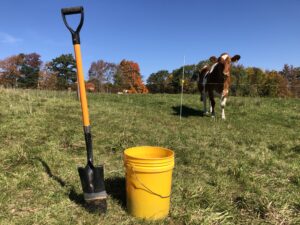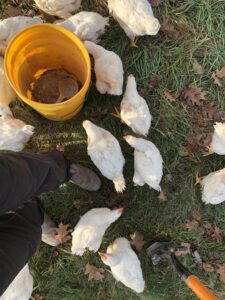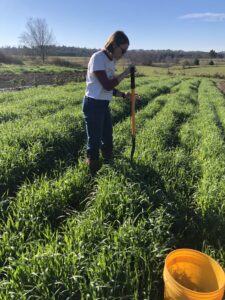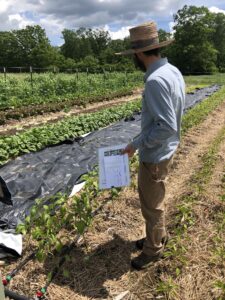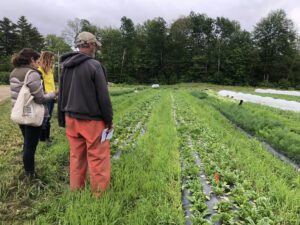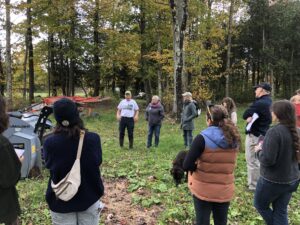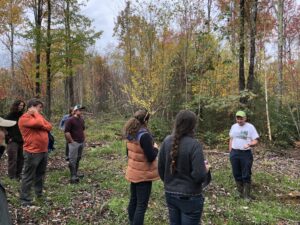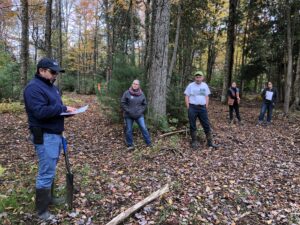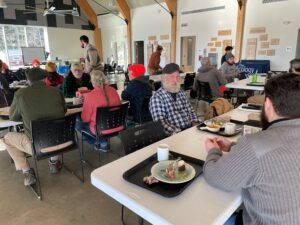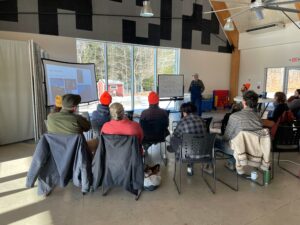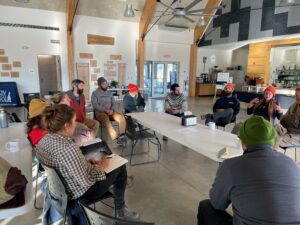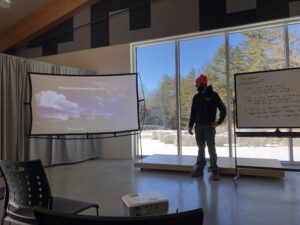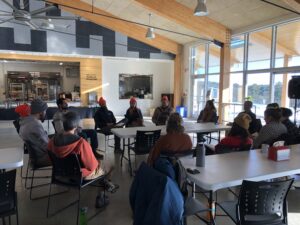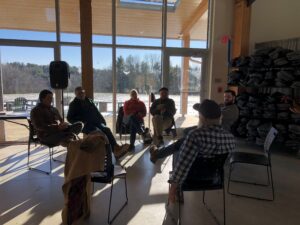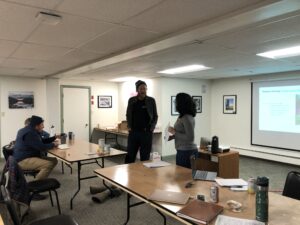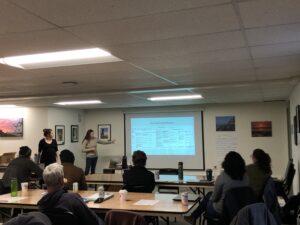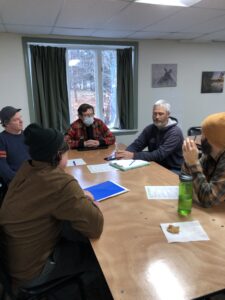Progress report for ONE21-398
Project Information
This project seeks to:
1: Support Maine farmers in learning about their soils to improve soil health
2: Take thorough soil health measurements and collect management data
3: Submit Maine data to Pasa’s Soil Health Benchmark Study; Pasa will produce reports for farmers to compare and learn about their soils
4: Coordinate ongoing farmer outreach, education, and collaborative engagement
5: Develop a peer-to-peer network of farmers interested in soil health and climate resilience, to support one another and share field management techniques
A 2019 Statewide Engagement Process on Maine Farmers’ Needs & Priorities indicated that farmers’ greatest need is for a variety of information, resources, and education to support day-to-day farm operations, including skills related to managing soils (Skakalski, 2019). Farmers are limited in their access to the information, technology and finances needed for the large-scale adoption practices that improve soil health. Measurement tools are often expensive, proprietary, and do not communicate with each other, creating data silos and withholding insights from farmers to help manage land effectively.
MFT and WNC are engaging farmers in the Maine Soil Health Network to implement climate-friendly practices on a wide range of farms across the state. In 2022, we now have two cohorts of farm partners, 6 in the 2021 cohort and 10 in the 2022 cohort. Farmers in the network receive financial and technical support to monitor soil health on their farms (Soil Health Benchmarking Study) and commit to participating in regular workshops to share results with other members of the cohort and technical assistance providers. The long-term vision for the Maine Soil Health Network is to support a farmer-led peer learning model around climate-friendly practices in Maine.
The Maine Soil Health Network will utilize tools and technology developed by OpenTEAM, (Open Technology Ecosystem for Agricultural Management), an initiative for using open-source technology to improve soil health and share information and resources between farms. Led by WNC, a collaborative group of farmers, scientists, industry leaders and agriculture technologists, OpenTEAM technology offers field-level carbon measurement, digital management records, remote sensing, predictive analytics and input and economic management decision support in a connected platform that reduces the need for farmer data entry while improving access to a wide array of tools. The participating farms in the Maine Soil Health Network will utilize OpenTEAM technology to track management practices and soil health.
The Maine Soil Health Network is collaborating with Pasa (Pennsylvania Association for Sustainable Agriculture) as the Maine cohort for their Soil Health Benchmark Study, a citizen science project aiming to help farmers assess the health of soils, compare data to their peers, and track changes in soil over time with different management practices. The study seeks to allow farmers to learn from each other and to develop solutions to soil health problems in their production systems. Pasa is part of the OpenTEAM network, and current farms in the Benchmark study are already utilizing OpenTEAM technology to measure soil health. The Maine cohort now joins hundreds of other farms across Pennsylvania and Maryland in measuring their soil health on-farm.
Agricultural natural climate solutions have been identified as important strategies for improving farm viability and contributing to state-wide climate change mitigation. By improving soil health, Maine farmers can see an increase in yields and profits per acre, as well as enhanced adaptation and resilience (Daigneault, Simons-Legaard, Birthisel, Carroll, Fernandez, and Weiskittel, 2020). To achieve these benefits, the proposed Maine Soil Health Network presents an organized program for providing training, technical and financial soil sampling and analysis interpretation support to farmers throughout the state with the goal of improving soil health on farms.
Cooperators
- - Producer
- - Technical Advisor
- - Producer
- - Producer
- - Producer
- - Producer
- - Producer
- (Educator and Researcher)
- - Producer
- - Producer
- - Producer
- - Producer
- - Producer
- - Producer
- - Producer
- - Producer
- - Producer
Research
In spring 2021, MFT secured 8 farm partners throughout the state as program participants for the pilot cohort of the Maine Soil Health Network. Each of these farmers represented a diversified vegetable or livestock/dairy farming operation, are MFT easement holders, and have committed to staying in the program for at least 3 years. The combined support from the Northeast SARE award and a Maine CIG award allows our pilot cohort of farmers to participate in the PASA soil Health Benchmarking study, and supports the participating farmers with travel, accommodation, and educational stipends to access educational opportunities around soil health and climate friendly farming practices. We believe that this added financial support for farmers will be very meaningful in advancing their learning and soil health goals, and will allow us to make greater progress towards the objectives below.
Unfortunately, in January 2022 two of the participating farms decided to remove themselves from the Maine Soil Health Network. Songbird Farm is facing a major PFAS contamination on their small grains and vegetable operation. Luckily, grains do not take up the PFAS which has allowed them to save their crop this past season, but the farm is facing long term soil contamination problems. They simply do not have the bandwidth for anything else at this point. We still plan to give them the results from the soil testing performed in fall 2021, but they do not want to be involved in the Network moving forward. Additionally, the owner Ketch Farms is navigating some personal issues and also does not have the bandwidth to continue his involvement in the Network moving forward.
In 2022 we recruited 10 additional farms for our second year cohort bringing our total up to 16. These farms are being supported through the CIG and SARE grant as described above. The additional farms in cohort two expand the projects geographic reach of the project. In 2023 Maine Farmland Trust secured additional funding to further incorporate this pilot project into their core programming, adding capacity in their "Climate Resilience" program to continue to offer participation in Pasa's soil health benchmarking study and in the paired climate adaptation planning program. This represents a huge success in continuing the impact and success of this SARE and CIG grant funded pilot project.
Farmer Selection Process
To select our current farmer partners, we reached out to farmers who have MFT conservation easements on their land to share more information on the program and ask them to fill out a simple application to join the program. For all farm partners we asked for a multi-year commitment at the outset. Here is a link to the application form that we used in 2021, which received 11 applications with a total of 8 accepted farms: https://docs.google.com/forms/d/e/1FAIpQLScGNICiUHMA4_YEq4s00_IJ4TdD2lEy86k5R8r1RhKYh5rBzw/viewform?usp=sf_link
Based on our experiences with the application process in 2021 and 2022, we do not anticipate any challenges recruiting additional participants in 2023. The current farmers we have been working with can help with outreach and encourage other farmers to join the network, given their experience, and now that we have secured grant funds to support the project for multiple years, and to support farmers to learn about soil health and attend our events, we think it will be an even more attractive proposition for farmers, since we are offering larger and more secure financial support to advance soil health goals on their farms.
Objective 1: Train farmers in soil health tools, technology, and field management techniques
All participating farmers are trained to take soil tests and will learn record-keeping management using the OpenTEAM suite of tools. Each year, farmers send in soil samples to Cornell Soil Health Laboratory, who measures a comprehensive array of physical, biological, and chemical soil attributes, including aggregate stability, organic matter, microbial respiration, and nutrient levels.
In the farm’s first year, a member of MFT/WNC teams visits each farm twice throughout the year to provide hands-on training to farmers on how to take soil samples and utilize an OpenTEAM technology called SurveyStack, a platform for data collection, record keeping, and sharing. The data collected in SurveyStack can automatically transfer to FarmOS (on farm record keeping tool) for participants that opt to use both platforms. In subsequent years of the program, farmers are sent the materials needed to collect soil samples, but farmers will do so on their own. All soil samples are collected in the fall for consistency with the collection schedule for Pasa's study.
Objective 2: Take thorough soil health measurements and collect management data
Each participating farmer commits to a streamlined process for taking soil health measurements and data collection. At each farm, three fields or pastures will selected for monitoring, with oversight from the MFT/WNC team, and should be similar enough to be able to loosely treat them as replicates; they should have the same soil type and texture, similar management strategies, and a similar land use history. Management practices on these fields will be tracked using an Excel spreadsheet or SurveyStack, and include: 1) tillage, cultivation, and any farm operations involving soil disturbance or compaction; 2) planting and termination dates for crops and cover crops, and 3) application dates and quantities for all fertilizers and soil amendments (Pasa, 2018). Measurements will be taken for aggregate stability, organic matter, microbial respiration, and nutrient levels of the soil from each field. All soil samples will be sent to Cornell Soil Health Laboratory for a comprehensive assessment.
Soil sampling equipment was purchased using budgeted SARE funds in Fall 2021, prior to soil testing:
- Two shovels
- Two Tarps
- Permanent Markers
- Two Tape measures
- Gallon plastic bags for sampling
- Gaiia Maps for recording GPS coordinates of sample locations and field boundaries
In 2021, 2022, and 2023 all soil sampling went smoothly aside from Ketch Farms (2021 cohort, see note below). The farmers chose their fields prior to sampling. Soil sampling support staff taught farms how to soil sample for sampling next year. For the 2021/2022 cohort of farmers, who all received soil sampling training in fall of 2021/2022, farmers did not experience any challenges in collect their soil samples independently and without the support of MFT/WNC support staff.
Soil samples were taken from the following farms in fall of 2021:
Balfour Farm (Pittsfield, Maine) - dairy
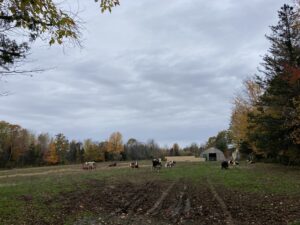
Bumbleroot Farm (Windham, Maine) - diversified veggies
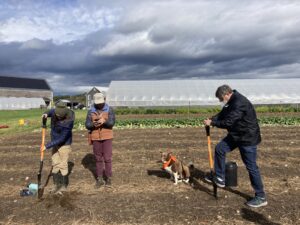
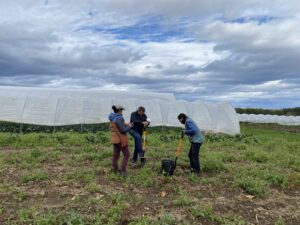
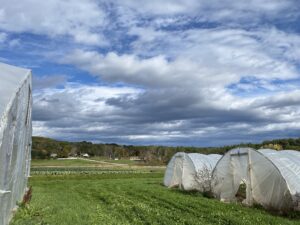
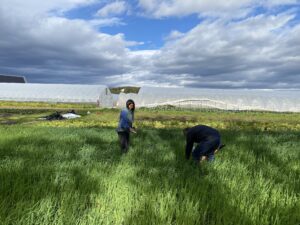
The Milkhouse (Monmouth, Maine) - dairy
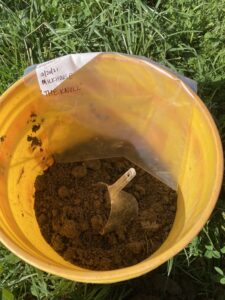
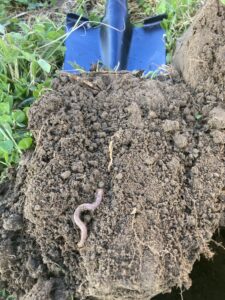
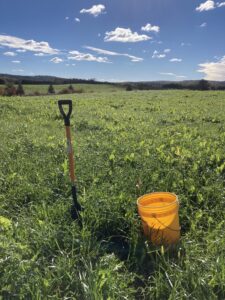
Songbird Farm (Unity, Maine) - diversified veggies and small grains - As noted above, Songbird Farm has decided to leave the Network as of January 2022. All soil health test results from Fall 2021 will still be communicated to the farm.
South Paw Farm (Freedom, Maine) - diversified veggies
Two Coves Farm (Harpswell, Maine) - livestock ( cattle, sheep, hens)
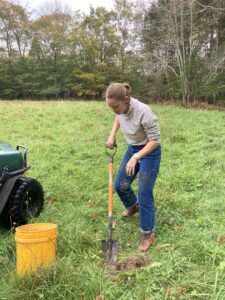
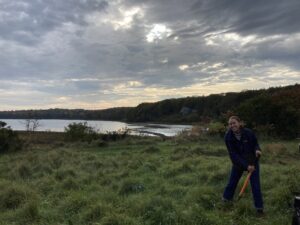
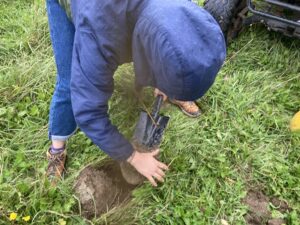
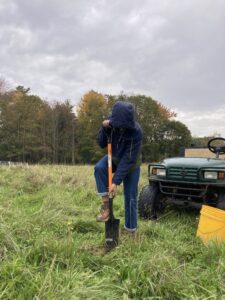
Erickson Fields (Rockport, Maine)- diversified veggies
Wolfe's Neck Center (Freeport, Maine) - Veg - WNC is a non profit collaborator, meaning we sample with them and Pasa will generate the reports, but WNC is responsible for payment
Aldemere Farm (Rockport, Maine) - cattle - non profit collaborator, meaning we sample with them and Pasa will generate the reports, but Aldemere is responsible for payment
Ketch Farms (Aroostook County, Maine): We were unable to sample at Ketch farms due to weather. Andrew Ketch has decided to back out of the Network as of January 2022.
Soil samples were taken from the following farms in fall of 2022:
High View Farm (Harrison, ME) - livestock (grassfed dairy)
Additional instagram Post from visit.
WoodHaus Farm (Waldoboro, ME) - Livestock (diversified, pigs, sheep, goats, chickens):
East Forty Farm (Waldoboro, ME) - Livestock (pigs, cows - dairy)
Sheepscott General Farm (Whitefield, ME) - Diversified Vegetable
Sunrise Farm (North Belgrade, ME) - Livestock (diversified, cows, goats, sheep)
Hunnewell Farm (Durham, ME) - Diversified Vegetable
Instagram post from fall soil sampling visit linked here.
Orange Circle Farm (Berwick, ME) - Diversified Vegetable
Spring visit at Orange Circle farm.
Stonecipher Farm (Bowdoinham, ME) - Diversified Vegetable
Six River Farm (Bowdoinham, ME) - Diversified Vegetable
Spring visit with Six River Farm.
Guimond Farm (Fort Kent, ME) - (cows - cattle)
Objective 3: Submit local data to Pasa’s Soil Health Benchmark Study for farmers to compare and learn about their soils
The Maine Soil Health Network has been accepted as an official member of Pasa’s Soil Health Benchmark Study, a large multi-year study where soil health and management practices will be compared to other similar farms, and each farm’s own past results, in an annual report. Pasa’s Soil Health Benchmark Study is a citizen-science project that began in 2016 that lets farmers comprehensively assess the health of their soils and see how their soil health data compares to the data of their peers. By identifying soil health benchmarks, this project gives farmers a clearer picture of whether their sustainable soil health management techniques are achieving their intended results, or if there is room for improvement.
Farmers will submit their soil management data in the winter months, and receive a report analyzing their soil test results in the spring as part of Pasa’s Soil Health Benchmark Study. Pasa staff scientists organize this data and generate three additional management indicators: 1) days of living cover, 2) tillage intensity, and 3) organic inputs. These indicators provide a snapshot of some of the farm management practices that most influence soil health (Pasa, 2018). This grant would cover the costs of soil tests and report production for farms in the program. MFT and WNC will organize farmer forums and field visits to discuss soil health management strategies and collaborate to develop innovative yet practical solutions to common soil health issues. Farmers will be encouraged to learn from their data and management practices of their peers both in the Maine cohort and within the benchmark study as a whole with fellow farmer cohorts in Pennsylvania and Maryland.
Objective 4: Coordinate ongoing farmer outreach, education, and collaborative engagement
Each cohort of the Maine Soil Health Network will be required to attend 3-4 meetings per year to collaboratively discuss observations, challenges, management practices, soil test results, and to get support with the technological and record keeping tools. These meetings take place in a ‘digital coffee shop’ format, at on-farm field days in the summer, and in fall/winter farmer-to-farmer workshops. These workshops and gatherings will provide the opportunity for farmers to connect with a learning community of peers who are working to devise practical solutions to soil health challenges. Each workshop will include facilitated discussions as well as space for providing feedback on the program. In 2022 and 2023 the winter workshops will focus more on the results of the benchmark study, comparing their soils and practices to each other and to their own farms throughout time.
Starting in winter of 2023, project funds will enable farmers to travel and learn at regional workshops, conferences and other events. Due to the on-going COVID-19 pandemic, farmers are much less interested in traveling long distances for conferences and trainings, after chatting with all of the farmers during our spring visits and fall workshop in 2022, we have decided to expand the flexibility offerings for farmers educational stipends to include: training and local educational support, to accommodate their educational interests and desire to limit their travel. Additionally, with financial and travel support from PASA, all Maine Soil Health Network participants have been invited to attend the PASA Conference in February 2023, there they will access pre-conference workshops and networking sessions with other Benchmarking Study participants . WNC and MFT co-designed the pre-conference workshop with PASA.
Objective 5: Develop a peer-to-peer network of farmers interested in soil health and climate resilience, to support one another and share field management techniques
Through the Soil Health Network, WNC and MFT seek to advance integrated farmer approaches to the adoption of climate smart health practices beyond the scope of the participating cohort to the general farmer population in Maine. We've now successful held three on-farm events open to the general farmer population in Maine. In June of 2021, we held a launch event at the Milkhouse, followed by Farmer-to-Farmer event held at Bumbleroot Farm in fall. In summer 2022, one Farmer-to-Farmer events was held at Stonecipher Farm in Bowdoinham focused the educational content and tour on no-till practices. The event was attended by over 60 participants. Photos from MSHN Summer Field Day at Stonecipher Farm: https://www.instagram.com/p/Cf6vNWHLavv/
In fall of 2023, we held two Farmer-to-Farmer events at MSHN farmers: We hosted a workshop on silvopasture and explored themes of climate adaption, soil health, and financial planning themed workshop with Balfour Farm, the event was attended by 15 participants. We also hosted a contour farming and keyline design principles workshop with Sheepscot General Farm, the event was attended by ~30 participants.
Photos from Balfour Farm Workshop:
We held two winter educational workshop series: a full day workshop in December of 2022 at the Ecology School, located in Saco, Maine and a full day workshop in January of 2023 at Viles Arboretum. This winter convening was scheduled to be an overnight retreat, however based on farmer feedback during the sampling season, we split the event into two full day workshops. The farmer-to-farmer retreat at the Ecology School provide an opportunity for the farms in the network to reflect on the season, and reflect together during the off-season. This event included a morning session with a presentation from each farm on soil health lessons and challenges, and an afternoon session in facilitated breakout conversations to allow the groups to learn from each other in facilitated conversation with the help of the Ecology School’s educators. We had 1-2 representatives from 12 out of the 16 participating farms attend.
Our January 2023 event was focus on climate adaptation planning and included content and facilitated discussions with invited speakers from University of Maine Professor, Dr. Rachel Schattman and two members of her lab to lead this training. This event was planned in response to farmer's request to hear from outside experts on topics identified by the group and served as an opportunity for farmers to connect their on-farm monitoring, soil health practices, and connect to long-term climate adaptation planning. After the training farmers will work 1:1 with network coordinators to develop on-farm climate risk assessments and climate adaptation plans. Upon completion of this process farmers will be able to access transition grants to being implementation with funding from the NRCS CIG grant and additional funding from MFT. We had 1-2 representatives from 14 out of the 16 participating farms attend.
We are planning a share out and report out workshop at Wolfe's Neck Center for MSHN participants to share out their learnings, reflections, and connect with one another around their participation in this project, the benchmarking study, climate adaption in February of 2024.
Photos from our Winter Workshop held on December 13th at the Ecology School in Saco (supported by SARE funds):
Photos from our Climate Adaptation Workshop held at Viles Arboretum in January of 2023 (supported by SARE funds and MFT):
Cornell soil health assessments have been collected at each farm and made available to each farm for each year of the study. 2021 Benchmarking results were made available in early 2023 for Cohort 1 and 2022 are currently being analyzed by Pasa and will be available.
The benchmarking study results allow each farm to track the impact of their management practices as well as region, climate, and soil type on soil health outcomes. They can compare their results to aggregated results from the entire data set.
Education & Outreach Activities and Participation Summary
Participation Summary:
A key component of this project is facilitating shared learning between the members of the Soil Health Network, making outreach a foundational element of the work. As described above, a major focus of our outreach efforts are to facilitate knowledge-sharing among network members and create demonstration and outreach opportunities for farmers across Maine. In 2021 we hosted two farmer-to-farmer events at participating farms to share soil health management practices and information on the network with other farmers, one at the Maine Milkhouse, and at Bumberoot Farm, representing a diversity of operation types and demonstrate soil health practices being implemented on a diversified vegetable farm and a organic dairy. In July of 2022, we held a farmer-to-farmer event at Stonecipher farm to demonstrate no-till practices, this event was attended by over 60 participants that included farmers (over 50%), technical service providers, and general public members). In 2023 we held two on-farm field days/workshops, one focused on the climate, financial, and soil health benefits of silovpasture at Balfour Farm, and another focused on keyline/contour farming to address water issues and soil health at Sheepscot General far.
We held six trainings online trainings, in the form of "virtual office hours' for famers seeking assistance in data entry into SurveyStack, our OpenTEAM tool for record keeping and data management. Two were held in the winter of 2021/2022 and two were held in the winter of 2022/2023, and two were held in fall/winter of 2023/2024.
Thus far we have organized and hosted 3 of 4 of a webinar series for farmers focused on soil health, climate adaptation strategies and government cost share and incentive programs. The first online training webinar took place in January 2022 to review the Cornell Soil Health results for the first year cohort. Bruce Hoskins and Jason Lilly from the University of Maine will teach how to read and interpret these soil tests. We will host a similar online webinar on interpreting these soil tests in January of 2023. We hosted 2 more webinars jointly with PASA staff when the 2021 soil health benchmarking reports were released in summer of 2023.
In 2022, we focused on in-person farmer workshops, over online webinars as a means of increasing attendance. For our 2022/2023 winter educational workshop series, we held a full day workshop at the Ecology School, located in Saco, Maine. This convening was scheduled to be an overnight retreat, however based on farmer feedback we split the event into two workshops, one at the Ecology School and one scheduled for January of 2023 at Viles Arboretum. The farmer to farmer retreat at the Ecology School provide an opportunity for the farms in the network to spend time together during the off-season. This event was planned with two sessions, a morning session with a presentation from each farm on soil health lessons and challenges, and an afternoon session in facilitated breakout conversations to allow the groups to learn from each other in facilitated conversation with the help of the Ecology School’s educators. We had 1-2 representatives from 12 out of the 16 participating farms attend. Our January 2023 Event was focus on climate adaptation planning and we have invited UMaine Professor, Dr. Rachel Schattman and her graduate students to lead educational content. This event took place at Viles Arboretum and was designed to support farmers with tools and training to link their on-farm soil health results to long-term climate adaptation planning.
For public and farmer outreach, we've published a webpage for the Soil Health Network. In 2022 we posted 2 blog posts (Building Farmer Networks for Soil Health, Training Farmers.) and 5+ social media posts across both MFT and WNC's platforms, because benchmarking study results from year 1 cohort have been delayed by PASA we share to ramp up public communications to share results in 2023. Additional activities planned for 2023 include additional blog posts and written content to share updates and activities. In early winter of 2024 we plan to utilize these communications channels to share results from the benchmark study, which will be available after soil testing is completed.
Learning Outcomes
January 2023 - No learning outcomes reported thus far in the project, in part due to delays in receiving PASA soil health benchmarking study results, we did receive 2021 benchmarking reports in summer of 2023 for cohort 1, and expect 2022 benchmarking reports this winter for both cohorts. We are hosting an in-person reflections and report-out meeting with participants in Feb 2024. Surveys to be taken by farmers around this time to gauge learning outcomes from their 2-3 year participation in the benchmarking study.
